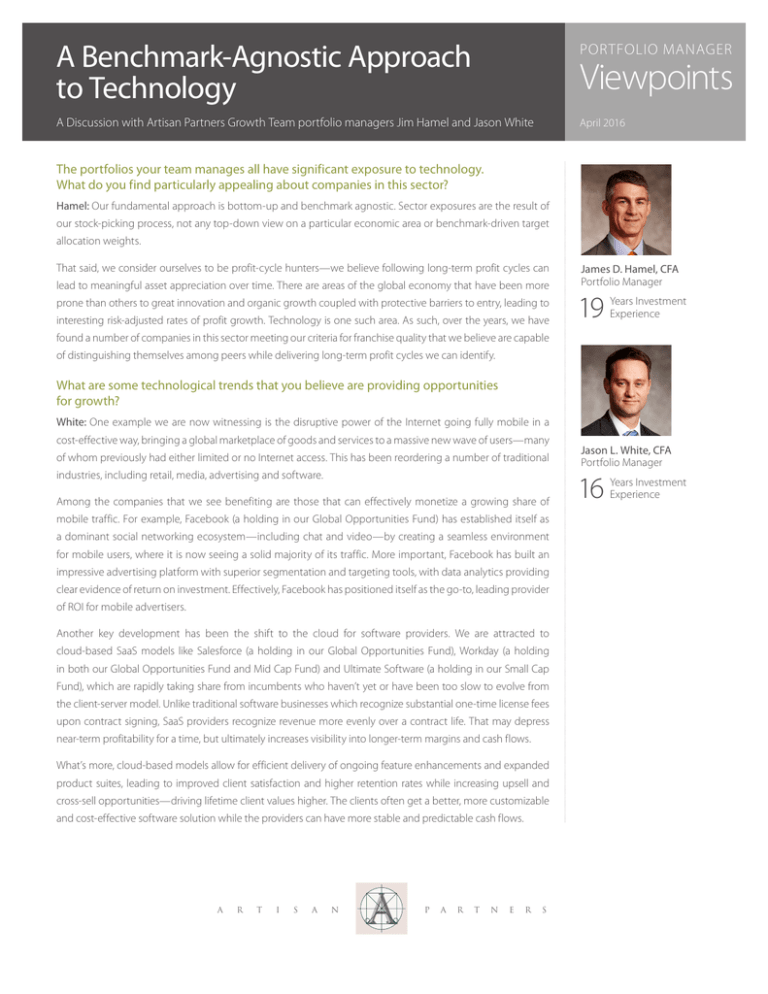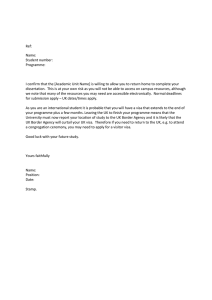
A Benchmark-Agnostic Approach
to Technology
PORTFOLIO MANAGER
A Discussion with Artisan Partners Growth Team portfolio managers Jim Hamel and Jason White
April 2016
Viewpoints
The portfolios your team manages all have significant exposure to technology.
What do you find particularly appealing about companies in this sector?
Hamel: Our fundamental approach is bottom-up and benchmark agnostic. Sector exposures are the result of
our stock-picking process, not any top-down view on a particular economic area or benchmark-driven target
allocation weights.
That said, we consider ourselves to be profit-cycle hunters—we believe following long-term profit cycles can
lead to meaningful asset appreciation over time. There are areas of the global economy that have been more
prone than others to great innovation and organic growth coupled with protective barriers to entry, leading to
interesting risk-adjusted rates of profit growth. Technology is one such area. As such, over the years, we have
James D. Hamel, CFA
Portfolio Manager
19
Years Investment
Experience
found a number of companies in this sector meeting our criteria for franchise quality that we believe are capable
of distinguishing themselves among peers while delivering long-term profit cycles we can identify.
What are some technological trends that you believe are providing opportunities
for growth?
White: One example we are now witnessing is the disruptive power of the Internet going fully mobile in a
cost-effective way, bringing a global marketplace of goods and services to a massive new wave of users—many
of whom previously had either limited or no Internet access. This has been reordering a number of traditional
industries, including retail, media, advertising and software.
Among the companies that we see benefiting are those that can effectively monetize a growing share of
mobile traffic. For example, Facebook (a holding in our Global Opportunities Fund) has established itself as
a dominant social networking ecosystem—including chat and video—by creating a seamless environment
for mobile users, where it is now seeing a solid majority of its traffic. More important, Facebook has built an
impressive advertising platform with superior segmentation and targeting tools, with data analytics providing
clear evidence of return on investment. Effectively, Facebook has positioned itself as the go-to, leading provider
of ROI for mobile advertisers.
Another key development has been the shift to the cloud for software providers. We are attracted to
cloud-based SaaS models like Salesforce (a holding in our Global Opportunities Fund), Workday (a holding
in both our Global Opportunities Fund and Mid Cap Fund) and Ultimate Software (a holding in our Small Cap
Fund), which are rapidly taking share from incumbents who haven’t yet or have been too slow to evolve from
the client-server model. Unlike traditional software businesses which recognize substantial one-time license fees
upon contract signing, SaaS providers recognize revenue more evenly over a contract life. That may depress
near-term profitability for a time, but ultimately increases visibility into longer-term margins and cash flows.
What’s more, cloud-based models allow for efficient delivery of ongoing feature enhancements and expanded
product suites, leading to improved client satisfaction and higher retention rates while increasing upsell and
cross-sell opportunities—driving lifetime client values higher. The clients often get a better, more customizable
and cost-effective software solution while the providers can have more stable and predictable cash flows.
A
R
T
I
S
A
N
P
A
R
T
N
E
R
S
Jason L. White, CFA
Portfolio Manager
16
Years Investment
Experience
What is your approach to identifying growth opportunities among technology companies?
Hamel: First and foremost, our approach to investing in technology companies is no different than any others. We want to identify solid franchises with
substantial protections against competitor encroachment. Those may include the possession of a proprietary asset, dominant market share, a low-cost
production capability relative to peers and/or a defensible brand name. We also want to identify a durable catalyst or catalysts—whether internal to the
company or external or both—that we believe can drive a substantial, long-term profit cycle. And then, we want to invest when we believe the company
is reasonably valued relative to its potential to generate interesting rates of profit growth.
But moving beyond that, because our approach was thoughtfully designed to be benchmark agnostic, we aren’t beholden to specific sector weights.
We are also freed from what can be somewhat arbitrary company categorizations.
Let’s look at what that means in practice by considering Visa (a holding in our Global Opportunities Fund). Visa operates the world’s largest retail electronic
payments network. It is benefiting from two strong secular trends: solid growth of digital payments and increasing demand for transactional security,
where Visa has significant first-mover advantages. In this vein, Visa is currently undergoing a merger with Visa Europe—a combination we believe will
eventually provide Visa a unified platform, allowing for share gains as Visa more effectively negotiates with merchants globally. What’s more, cost synergies
should open opportunities for margin expansion in the Visa Europe business.
Most indices classify Visa as a technology company. But we don’t see it that way—we consider Visa more as a combination consumer financials company.
Yet, it adds—arbitrarily, in our view—to our technology weighting. That might prove problematic if we’re trying to stay within target sector weight
guidelines. But our process and approach frees us from those constraints. Conversely, if we were to hunt for such companies among those an index deems
“financials” or “consumer discretionary,” we might end up overlooking a solid franchise with what we believe is a long runway for growth that is otherwise
an excellent example of our process at work.
For more information:
Visit www.artisanpartners.com | Call 800.344.1770
Carefully consider the Fund’s investment objective, risks and charges and expenses. This and other important information is contained in the Fund’s prospectus and summary prospectus, which can
be obtained by calling 800.344.1770. Read carefully before investing.
International investments involve special risks, including currency fluctuation, lower liquidity, different accounting methods and economic and political systems, and higher transaction costs. These risks typically are greater
in emerging markets. Securities of small- and medium-sized companies tend to have a shorter history of operations, be more volatile and less liquid and may have underperformed securities of large companies during some
periods. Growth securities may underperform other asset types during a given period.
This summary represents the views of the investment team as of 30 April 2016, and is subject to change without notice. Security examples are for informational purposes only and are not representative of the entire portfolio. There is no
guarantee that investment within the securities mentioned will result in profit. While the information contained herein is believed to be reliable, there no guarantee as to the accuracy or completeness of any statement in the discussion. This
material is for informational purposes only and should not be considered as investment advice or a recommendation of any investment service, product or individual security.
For the purpose of determining the Funds’ holdings, securities of the same issuer are aggregated to determine the weight in the Funds. Portfolio holdings are subject to change without notice and are not intended as recommendations of
individual securities. The holdings mentioned comprised the following percentages of Artisan Global Opportunities Fund total net assets (including all share classes) as of 30 Jun 2016: Visa Inc 5.2%, Facebook Inc 4.0%, Salesforce.com
Inc 1.6%, Workday Inc 1.5%. The holdings mentioned comprised the following percentages of Artisan Mid Cap Fund total net assets (including all share classes) as of 30 Jun 2016: Workday Inc 1.9%. The holdings mentioned comprised
the following percentages of Artisan Small Cap Fund total net assets (including all share classes) as of 30 Jun 2016: The Ultimate Software Group Inc 3.6%.
Artisan Partners Funds offered through Artisan Partners Distributors LLC (APDLLC), member FINRA. APDLLC is a wholly owned broker/dealer subsidiary of Artisan Partners Holdings LP. Artisan Partners Limited Partnership, an investment
advisory firm and adviser to Artisan Partners Funds, is wholly owned by Artisan Partners Holdings LP.
© 2016 Artisan Partners. All rights reserved.
A
R
T
I
S
A
N
P
A
R
T
N
E
R
S
5/19/16 – A16628L_vR


